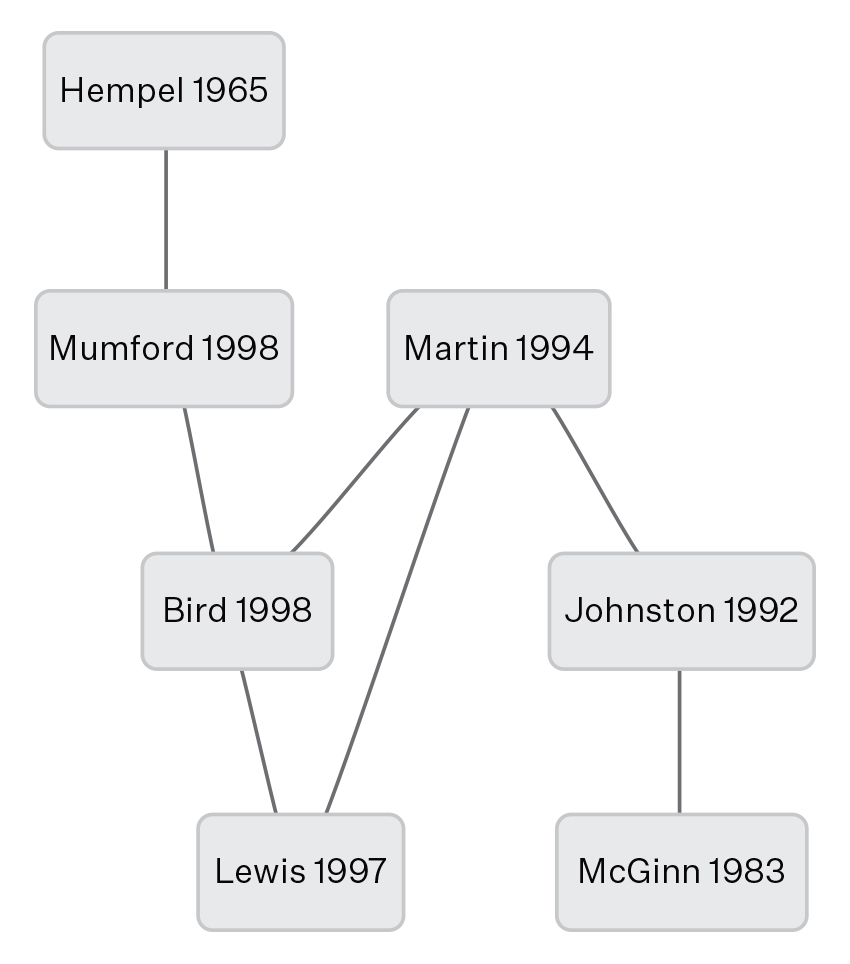EN PT/BR
A Preview of Divergent Search
Rodrigo Ochigame designs more critical methods of indexing and searching information. He shares a preview of ongoing work on “divergent search,” which seeks to facilitate exposure to divergent perspectives across linguistic and geographic barriers.
Divergent query: Conventional search queries are typically monolingual. Divergent queries use Boolean logic to combine automatic translations of search terms with curated terms in multiple languages. The following search query looks for texts discussing “linguistics” and “metaphor” that engage with queer theory and gender studies in German, Spanish, French, Japanese, Portuguese, and Russian.
Normal query
linguistics metaphor
Divergent query
(((Linguistik OR Sprachwissenschaft) AND Metapher)
AND (Queer OR Transgender OR Gender OR Geschlecht))
OR
((lingüística AND metáfora)
AND (queer OR cuir OR transgénero OR “estudios de género”))
OR
((linguistique AND métaphore)
AND (queer OR transgenre OR “études de genre”))
OR
((言語学 AND (比喩 OR メタファー OR 隠喩 OR 暗喩 OR 象徴))
AND クィア)
OR
((linguística AND metáfora)
AND (queer OR cuir OR transgênero OR “estudos de gênero”))
OR
(((языкозна́ние OR лингви́стика) AND мета́фора)
AND (Гендерные OR LGBT))
Divergent shuffle: Mainstream search engines tend to promote results that are popular and similar to each other. Divergent shuffling is a method of reordering search results to improve the visibility of divergent perspectives. The following list contains texts discussing “climate change” that appear in science studies journals from North America and Western Europe, Latin America, Eastern Europe, and Asia. The list is shuffled to ensure that the top results represent a diverse mix of regions.
Original order
- Andrew S. Mathews, “Scandals, Audits, and Fictions: Linking Climate Change to Mexican Forests,” Social Studies of Science 44, no. 1 (2014): 82-108.
- M. L. Martello, “Arctic Indigenous Peoples as Representations and Representatives of Climate Change,” Social Studies of Science 38, no. 3 (2008): 351-376.
- Steven Yearley, “Book Review: Human Choice and Climate Change,” Science, Technology, & Human Values 24, no. 4 (1999): 501-502.
- Nick Lee and Johanna Motzkau, “Varieties of Biosocial Imagination: Reframing Responses to Climate Change and Antibiotic Resistance,” Science, Technology, & Human Values 38, no. 4 (2013): 447-469.
- Shana Lee Hirsch and Jerrold Long, “Adaptive Epistemologies: Conceptualizing Adaptation to Climate Change in Environmental Science,” Science Technology, & Human Values, 2020.
- Casper Bruun Jensen, “Wound-up Worlds and The Wind-up Girl: On the Anthropology of Climate Change and Climate Fiction,” Tapuya: Latin American Science, Technology and Society 1, no. 1 (2018): 186-200.
- Simon Shackley and Brian Wynne, “Representing Uncertainty in Global Climate Change Science and Policy: Boundary-Ordering Devices and Authority,” Science, Technology, & Human Values. 21, no. 3 (1996): 275.
- David M. Hart and David G. Victor, “Scientific Elites and the Making of US Policy for Climate Change Research, 1957-74,” Social Studies of Science 23, no. 4 (1993): 643-680.
- Jessica O’Reilly, Naomi Oreskes, and Michael Oppenheimer, “The Rapid Disintegration of Projections: The West Antarctic Ice Sheet and the Intergovernmental Panel on Climate Change,” Social Studies of Science 42, no. 5 (2012): 709-31.
- Mark Vardy, “Relational Agility: Visualizing near-Real-Time Arctic Sea Ice Data as a Proxy for Climate Change,” Social Studies of Science, 2020.
Divergent shuffle
- Casper Bruun Jensen, “Wound-up Worlds and The Wind-up Girl: On the Anthropology of Climate Change and Climate Fiction,” Tapuya: Latin American Science, Technology and Society 1, no. 1 (2018): 186-200.
- Марина Лоскутова, “«Влияние лесов на обмеление рек есть только недоказанная ипотеза»: прикладная наука и государственная политика по управлению лесным хозяйством Российской империи второй четверти XIX в,” Историко-биологические исследования 4, no. 1 (2012): 9-32.
- Bishwanath Golder, “Energy Intensity of Indian Manufacturing Firms Effect of Energy Prices, Technology and Firm Characteristics,” Science, Technology and Society 16, no. 3 (2011): 351-372.
- Andrew S. Mathews, “Scandals, Audits, and Fictions: Linking Climate Change to Mexican Forests,” Social Studies of Science 44, no. 1 (2014): 82-108.
- Nupur Chowdhury, “Role of the Indian Supreme Court in Shaping Technology Development,” Science, Technology and Society 19, no. 1 (2014): 57-77.
- David Moon, “Уничтожение лесов в степных районах, 1760-1914,” Историко-биологические исследования 2, no. 4 (2010): 51-65.
- Augusto Tolentino Camargo, André Felipe Simões, and Sérgio Almeida Pacca, “O potencial de mitigação da mudança climática dos vetores energéticos da cana-de-açúcar na frota paulistana de veículos leves”, Revista Tecnologia e Sociedade 15, no. 37 (2019).
- M. L. Martello, “Arctic Indigenous Peoples as Representations and Representatives of Climate Change,” Social Studies of Science 38, no. 3 (2008): 351-376.
- Govert Gijsbers and Rob Van Tulder, “New Asian Challenges Missing Linkages in Asian Agricultural Innovation and the Role of Public Research Organisations in Four Small- and Medium-Sized Asian Countries,” Science, Technology and Society 16, no. 1 (2011): 29-51.
- “Hambre, alta tecnología y desigualdad social: Un desafío a inicios del siglo XXI,” Revista Iberoamericana de Ciencia, Tecnología y Sociedad 5, no. 14 (2010): 177-201.
Divergent network. Traditional search methods are often based on citation network analysis. Divergent networks are composed not of citations, but instead of interpretive relations that indicate divergent perspectives, such as critiques and reanalyses. The following network serves as a map of interpretive relations among texts in sociocultural anthropology. For example, Marisol de la Cadena’s “Indigenous Cosmopolitics in the Andes” offers an extension of the concept of “modern constitution” in Bruno Latour’s We Have Never Been Modern.
Co-citation network


Divergent network

